|
|
|
Sort Order |
|
|
|
Items / Page
|
|
|
|
|
|
|
| Srl | Item |
| 1 |
ID:
186363
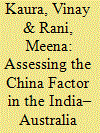

|
|
|
|
|
| Summary/Abstract |
The article argues that India and Australia have a significant role to play amidst China’s expanding maritime footprint in the Indian Ocean and growing influence in the South China Sea. With worsening relations between India and China as well as Australia and China, both New Delhi and Canberra have been deepening their connections, particularly after the COVID-19 pandemic. The article explores China as a key point of interest in India–Australia maritime cooperation and concludes that India–Australia ties have opened up the possibilities for expanding the arc of India’s strategic partnerships in the Indo-Pacific region..
|
|
|
|
|
|
|
|
|
|
|
|
|
|
|
|
| 2 |
ID:
180244
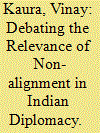

|
|
|
|
|
| Summary/Abstract |
The doctrine of non-alignment allowed India to remain aloof from the Cold War alliances while seeking to become a leader of the Non-Aligned Movement (NAM). The dominant view of scholarship on non-alignment is critical of India’s first prime minister, Jawahar Lal Nehru whose strategic adoption of the policy was converted into an ideology of anti-Americanism by his successors. Nehru has also been criticised for his pursuit of soft power without prioritising the acquisition of hard power. Since the end of the Cold War, Nehruvian ideas of non-alignment have been contested and replaced by neo-liberal perspectives.
|
|
|
|
|
|
|
|
|
|
|
|
|
|
|
|
| 3 |
ID:
181179


|
|
|
|
|
| Summary/Abstract |
The United Nations completed 75 years of its existence in 2020. The last 75 years have been a roller coaster ride for this global institution mandated to maintain peace. However, the UN has received widespread criticism for not reforming its various institutions, particularly the United Nations Security Council (UNSC). The G-4 nations which includes India, have led the call for accelerating the long-awaited reform process. This article analyses the history of the UNSC reform process with a particular focus on India’s attempts to become a permanent member to achieve its global ambitions, as well as the major hurdles along the way.
|
|
|
|
|
|
|
|
|
|
|
|
|
|
|
|
| 4 |
ID:
158396


|
|
|
|
|
| Summary/Abstract |
The partnership between India and Russia has been a success of Indian diplomacy, but the relationship is beginning to show signs of strain. The growing closeness between Russia and China and the possibility of the Kremlin’s strategic embrace of Pakistan, as evidenced by its willingness to engage with the Taliban, has fuelled the perception that Moscow and New Delhi are drifting apart. Vinay Kaura argues that, with the changing geopolitics of South Asia, New Delhi and Moscow need to pay greater attention to strengthening their relationship.
|
|
|
|
|
|
|
|
|
|
|
|
|
|
|
|
| 5 |
ID:
177904
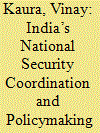

|
|
|
|
|
| Summary/Abstract |
The National Security Council (NSC) has become the most important institution on national security coordination, planning and policymaking in India, particularly since 2014. However, the government has been criticised for not institutionalising its national security architecture as many changes in the NSC system are seen as personality centric. Vinay Kaura assesses the key characteristics and functioning of the evolving NSC coupled with the role and influence of individuals and institutions. He contends that a decline in prime ministerial trust or interest, which seems unlikely until 2024, could moderate the NSC’s role in policymaking on national security.
|
|
|
|
|
|
|
|
|
|
|
|
|
|
|
|
| 6 |
ID:
179575


|
|
|
|
|
| Summary/Abstract |
India and China are two powers in Asia, having common borders but different sense of entitlements and vulnerabilities. China’s global profile has become much stronger than India’s. How India and China deal with each other will determine peace and stability in the Indo-Pacific region. The challenge for New Delhi is to factor its national self-interest and security into dealings with a rising China. India is threatened by Chinese assertiveness, given its outstanding boundary disputes with China, Belt and Road Initiative, uncritical Chinese support for Pakistan and China’s increasing penetration into the Indian Ocean region. However, current Indian stance toward China is characterized by hedging, which has severe limitations dues to many structural constraints. The article argues that India should unhesitatingly increase its strategic engagement with America, Japan and Australia to strengthen the Quadrilateral. Despite some obvious differences, all four maritime democracies share a set of common strategic perceptions, which could deepen their security arrangements to manage China’s growing assertiveness.
|
|
|
|
|
|
|
|
|
|
|
|
|
|
|
|
| 7 |
ID:
175388
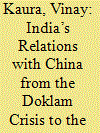

|
|
|
|
|
| Summary/Abstract |
No other bilateral relationship for India is as complex and challenging as the one with China. The intractable border dispute is at the root of their rivalry. The military stand-off at Doklam in 2017 had poisoned the bilateral relationship until steps were taken to remove mistrust and misunderstanding through two ‘informal’ summits between Prime Minister Narendra Modi and President Xi Jinping in 2018 and 2019. Nonetheless, the sense of general improvement in Sino-Indian ties generated at Wuhan and Mamallapuram was shattered by China’s aggressive behaviour in June 2020 at the Galwan Valley in Ladakh along the Line of Actual Control (LAC). The article traces key events during the Doklam stand-off and the violent military clashes at Galwan, as well as the steps taken by India to enhance political trust at the highest level. It contends that since there has been no change in China’s policies on a range of issues that are critical for India, it is not possible for India to remain ambivalent on how to deal with China. The article concludes that there seems to be greater recognition of the challenge from China and the need to recalibrate the Indian response.
|
|
|
|
|
|
|
|
|
|
|
|
|
|
|
|
| 8 |
ID:
165287
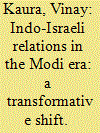

|
|
|
|
|
| Summary/Abstract |
India’s West Asia policy is being constantly reshaped under the tutelage of Indian Prime Minister Narendra Modi, whose Israel visit in July 2017 represents a momentous milestone in the Indo-Israeli relationship. The first ever visit of an Indian prime minister to the Jewish state unambiguously underscores that New Delhi under Modi is confident enough to deal with Israel as it deals with any other state in the volatile West Asian region without being concerned about third parties. Modi has been unequivocal in showing the importance India accords to its ties with Israel.
|
|
|
|
|
|
|
|
|
|
|
|
|
|
|
|
| 9 |
ID:
187139


|
|
|
|
|
| Summary/Abstract |
The article explains how Japan's strategic interests are converging with India against an assertive China in the Indo-Pacific. Japan has been pursuing a “Free and Open Indo-Pacific” (FOIP) policy, which seeks to manage China's rise by deepening Japan's strategic coordination and cooperation with its closest partners through the Quad. Though Japan still values its bilateral relationship with the United States (US), its security partnership with India is part of Tokyo's persistent efforts to support the US-led rules-based international order. In order to counter China's Belt and Road Initiative (BRI) in the Indo-Pacific region, Japan has been a strong supporter among the Quad to promote non-military cooperation, primarily focusing on infrastructure building, supply chain resilience and technological innovations. The article argues that Japan's strategic engagement with India is now an integral part of its wider national security posture as Tokyo has come to recognise New Delhi as an important balancer against Beijing. That the US has enhanced its ties with India in recent years has further facilitated Japan–India strategic convergence since it is aligned with American policy towards the Indo-Pacific region in an era of great power competition.
|
|
|
|
|
|
|
|
|
|
|
|
|
|
|
|
| 10 |
ID:
189442
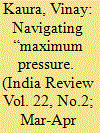

|
|
|
|
|
| Summary/Abstract |
The article highlights the convergence and divergence between US and India regarding Iran during the Trump administration and makes the following arguments. First, as Trump’s hard line on Iran was viewed negatively by India, New Delhi took measures to assert its longheld tradition of “strategic autonomy” in foreign policy which could not be ignored by the U.S. establishment despite Trump’s personal choices. Second, as Iran responded to the Trump’s hardening policies by gravitating toward China, the Trump administration became slightly more sensitive toward the complexities of IranChina bonhomie for Indian diplomacy. Third, although India was forced to cut back on importing Iranian oil due to sanctions in mid-2019, American officials began to view India-Iran-Afghanistan collaboration on the Chabahar port project as an opportunity to boost the Afghan economy, and exempted the project from sanctions. The article concludes that despite strong divergences on Iran, the Trump administration came to pursue a combination of pressure and engagement with India to reduce divergence on Iran.
|
|
|
|
|
|
|
|
|
|
|
|
|
|
|
|
| 11 |
ID:
175462
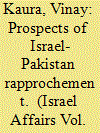

|
|
|
|
|
| Summary/Abstract |
Pakistan is among the Muslim Islamic states that do not recognise and/or maintain diplomatic relations with Israel. Yet this situation has been changing dramatically as various Muslim states are establishing and/or seriously considering relations with Israel. In recent years, Israel’s relations with Saudi Arabia and the United Arab Emirates have marked an unprecedented improvement as the focus of many Arab countries has shifted from the Israeli-Palestinian conflict to countering Iranian influence. India’s ability to maintain close relations with Israel while maintaining good relations with many Middle Eastern countries and the Palestinians is seen by Pakistan’s political elite as a strong reason for the need to have normal relations with the Jewish state. The article argues that the prospects of an Israel-Pakistan rapprochement are very dim at present due to continuing salience of ideological nature of the Pakistani state and the growing Islamist orientation of its people.
|
|
|
|
|
|
|
|
|
|
|
|
|
|
|
|
| 12 |
ID:
181174


|
|
|
|
|
| Summary/Abstract |
Russia’s policy on Afghanistan has witnessed considerable transformation during the last two decades. This has allowed Moscow to change its stance towards the Taliban from confrontation to accommodation. The article explains Russia’s foreign policy trajectory towards Afghanistan, exploring the key determinants, approaches and potential outcomes. Drawing mainly on secondary sources as well as the statements of officials and experts, the article also seeks to highlight the recent trends in Russia’s Afghan policy. Against the backdrop of changing regional geopolitics, the analysis is likely to be useful for the Indian government which is recalibrating India’s own stance in the changing circumstances.
|
|
|
|
|
|
|
|
|
|
|
|
|
|
|
|
|
|
|
|
|